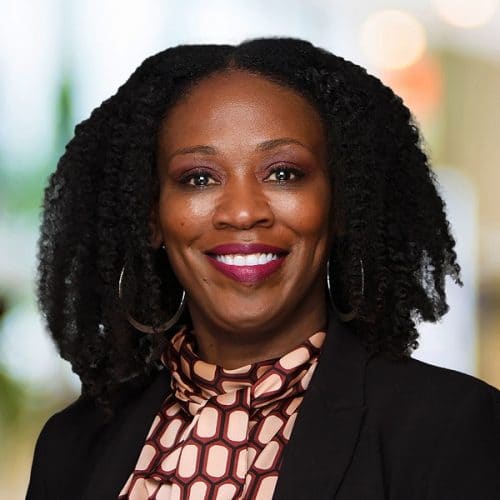
Keisha Bell, Managing Director and Head of Diverse Talent Management and Advancement at DTCC, shares her views on on company-wide diversity and WIF (women in finance) efforts. At DTCC, Bell is responsible for recruiting and retaining the best diverse talent and developing DTCC’s next generation of leaders through focused sponsorships and talent advancement strategies. She believes in changing mindsets, forging progressive practices, and views each employee as an agent of change.

What is the importance of promoting Women in Finance, and/or Diversity & Inclusion, initiatives for an organization? Is it a “nice to have” or a “must have”?
Diversity and inclusion initiatives, including activities that promote gender diversity, are “must haves” for every organization and, to be successful, need support from the Board level, down. Research continually demonstrates that businesses with more diverse teams produce better results and fosters innovation.
How would you describe the current landscape for WIF and/or D&I, in the finance industry? How has it evolved?
In my time in the financial industry, promoting women in finance, and more broadly achieving diversity across all levels of an organization, have become top priorities for firms. And while there is still a considerable way to go, there has been steady improvement and a true shift from the “Wall Street culture” from decades past. At DTCC, for example, we’ve changed how we approach conversations around systemic racism, sexism and intersectionality, and we are intentional in creating initiatives that help to promote dialogue and change. As a result of these efforts, more women are being promoted to leadership positions at DTCC, and nearing the 42% gender representation reported in a SIFMA Study issued at the end of 2019.
What progress still needs to be made, in terms of financial firms adopting advocacy of WIF and/or D&I as an ethos? What are the challenges?
While much progress has been made recruiting diverse talent and filling entry level roles, we must ensure that we have a path for women to move up the career ladder within firms. Strong campus recruiting and outreach to employees early in their careers are incredibly important, but so too are efforts to proactively identify “hi-potentials” within organizations and helping them grow into more senior positions. This is particularly important in STEM fields, where not only is the early pipeline less than other functions, but the path to senior roles is even smaller. The financial services industry must continue to commit to D&I in retention and promotion processes in the same way the industry has supported hiring and women early in their careers.
What has DTCC accomplished in the area of WIF and/or D&I, and what are current initiatives?
At DTCC, I am proud of the many initiatives we have to promote women in our organization. We are deliberate in our approach, taking into account intersectionality and all of the dimensions of diversity, including race, gender, identify and more. At the senior leadership level, we are almost at gender parity across our management committee and over half of our CEO’s direct reports are women. Our Emerging Women Leaders program helps our employees develop the capabilities to position them for the next step in their career progression, including an executive presence and foundational leadership skills program. We also are pleased to offer the Re-Emerge program for women who are re-entering the workforce after time away, our EDGE program for recent graduates, and our community work to shape tomorrow’s women leaders including our efforts with Girls Who Code.
How does DTCC measure success in WIF and/or D&I?
We believe in the value of data and track our progress closely, monitoring D&I stats across the organization. We are ultimately working towards reaching gender parity, looking at census data for racial and ethnic diversity benchmarks. For example, we track the number of women we have on our Board, the number of women in C-suite positions, and the representation of women across the organization, including how many women are progressing from entry into middle and senior level positions.
What is the future of WIF and/or D&I, both at DTCC specifically and in finance more broadly?
The future of the industry is greater gender parity – which will produce better results and positively impact firms and, more generally, society. To get there, the industry must continue to place significant focus on initiatives that promote diverse hiring, support and cultivate emerging female talent, and help to create tomorrow’s leaders. At DTCC, we believe data is key to understanding whether D&I strategies are successful, as well as to identify ways to further develop our strategies or to identify areas that require greater focus and investment.





